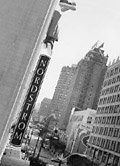SAY THE WORDS “public-private partnership” and you get one of three reactions. On the faces of downtown establishment types you see a look of sanctimonious reverence as visions of gleaming new stadiums, symphony halls, and “entertainment retail” attractions dance in their heads. From neighborhood rebel types you get a look of enraged resentment as they recall overpriced parking garages, taxpayer gifts to billionaires, and overturned baseball stadium elections. Of course the third and most common reaction is the vacant stare you get from people who have no idea what you’re talking about. Unfortunately, the latter group also includes some people who are running for Seattle City Council.
Public-private partnerships became a volatile issue in the ’90s due to the debate over the two new sports stadiums (which were mostly a county issue) as well as controversy surrounding a major downtown redevelopment project on Pine Street. The Pine Street deal provided tens of millions of dollars in federal and city subsidies to help Nordstrom open its new flagship store and to build the adjoining Pacific Place mall and its underground garage.
To supporters of that deal such as City Council veterans Margaret Pageler and Cheryl Chow, both of whom are running again, the Pine Street project was a wise use of public money. “Restoring a vibrant downtown core required partnerships with the business community and public investments,” Pageler says on her campaign Web site. “The result is a thriving activity center that provides tax returns for the whole city.” Chow herself is less dogmatic, saying she has not yet had a chance to look at the “budget returns” to see if the Pacific Place project is actually panning out for the city.
Judy Nicastro, who is challenging Chow, says, “It would be a different vote if I were on the council.” Nicastro calls the Pacific Place garage deal—in which the city agreed to pay developers $23 million more for the garage than it cost to build—”an absolute tragedy. That money could have built a lot of housing.” The city contends it will earn all the money back in parking revenue.
Nicastro says she would support public-private partnerships only if they provide significant public benefit: “It has to be more than just ‘job creation’ and ‘tax revenue.'” She suggests, for example, that free public performances be offered twice a year at taxpayer-backed Benaroya Hall. (Two nights of music for $45 million? It better be the Three Tenors. Or John Tesh.)
Nicastro’s knowledge of the subject is encyclopedic, however, compared to that of Curt Firestone, who is challenging Margaret Pageler. He drew a blank when asked about the public-private issue. “It’s not an area I’ve looked into,” he says. That’s not very reassuring, since one of Firestone’s central campaign themes is advocacy of a public-private partnership to build the Monorail.
Neighborhood troublemaker Charlie Chong, who is running for an open council seat against young politico Heidi Wills, was one of the whistleblowers on the Pine Street deal when he served on the council in 1997. But he sounds a somewhat conciliatory note today, saying that there was simply inadequate public disclosure of the terms of the deal. “Would I have been in favor of paying Nordstrom to move into the building? I might have,” Chong says. “My question to the council was, ‘If this project was so important to the city, why did they do it in the dark?'” In fact, Chong is supportive of a current proposal that would use city money to construct a parking garage in the Admiral section of West Seattle (Chong’s stomping grounds).
Chong’s opponent, Heidi Wills, puts all her emphasis on public disclosure, saying that the problem with Pine Street is that “the public woke up and read about it in the paper one day.” But Wills was completely unable to articulate what sorts of public-private partnerships she would support and why, saying only that “if the public is convinced there is sufficient benefit, then we should move forward.” Wills does get some bonus points for at least being familiar with the work of the city’s Task Force on Public-Private Partnerships, which released some recommendations earlier this year, most of which Wills supports. Chong dismissed the Task Force report as “one of those set-ups,” though he admitted he hadn’t read it.
Former TV talking head Jim Compton did not respond to the Weekly‘s request for an interview. His opponent Dawn Mason was, as ever, ready to rumble. She argues that the public-private partnership model needs to be turned on its head. “You’ve got the Salvation Army and the Union Gospel Mission located right next to those billion-dollar stadiums,” she says, “and they have to go begging for $10 and $15 handouts. Why don’t these corporations step up and give money like we gave to the stadiums?”
Mason wants to see the city use its bonding capacity for human services projects rather than retail and entertainment. “If we’re willing to say it’s an emergency when a sports team is leaving, then we should be able to say so when working artists are leaving or when kids have no place to go after school.”








